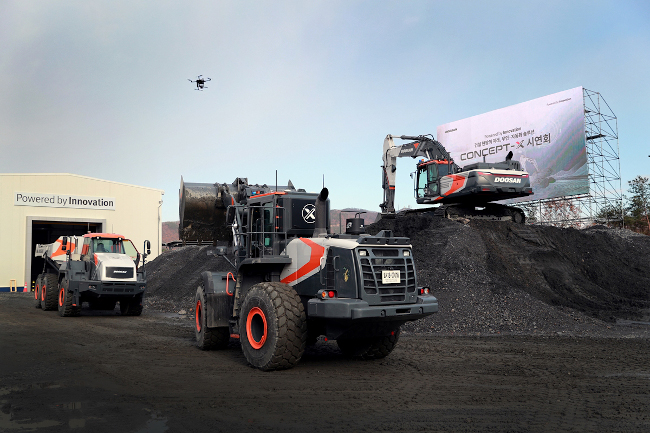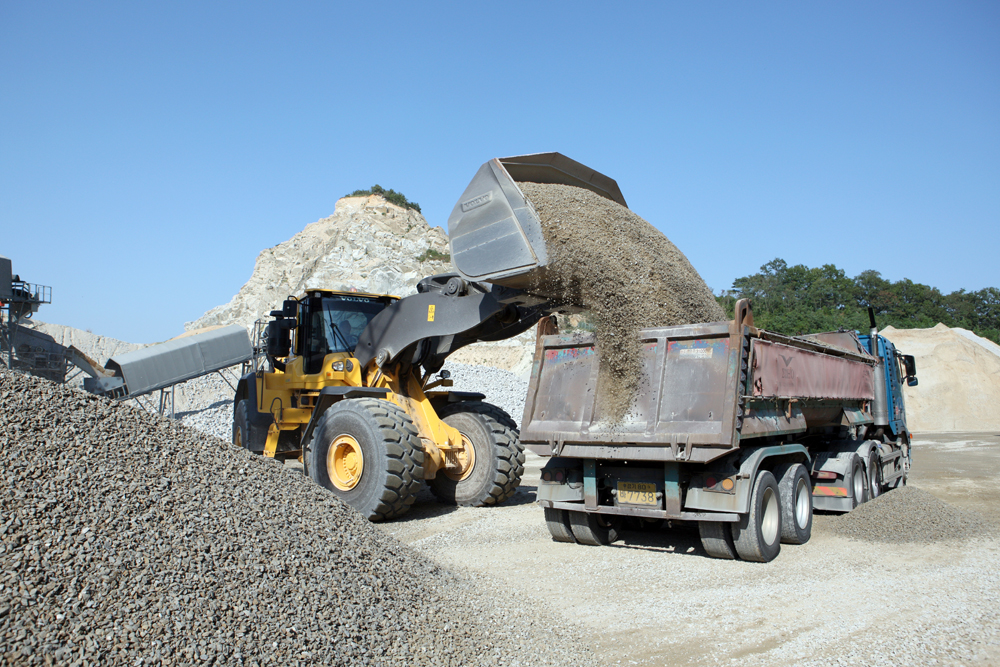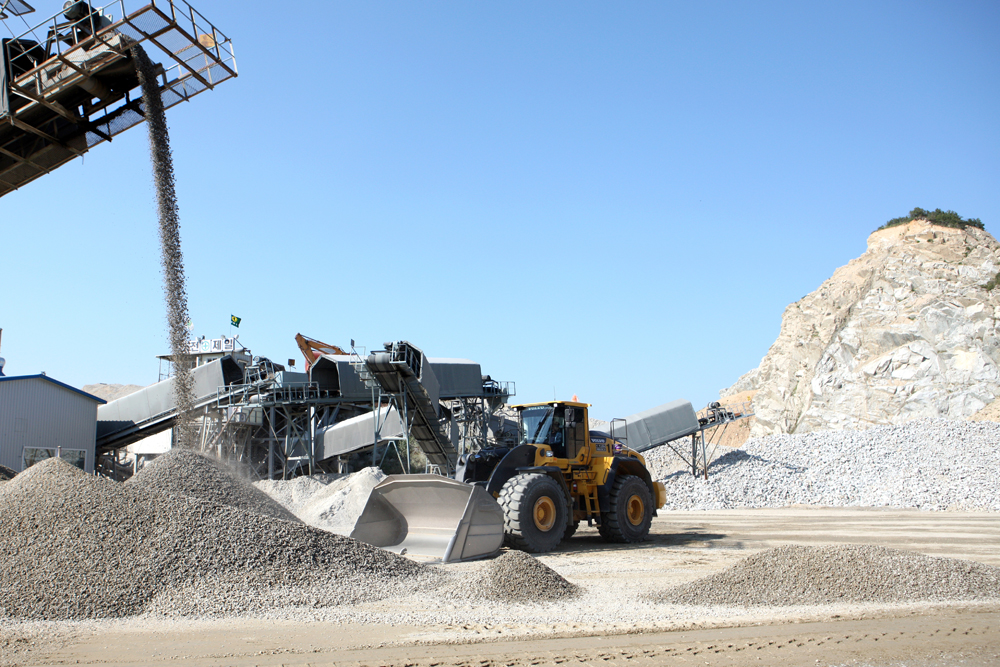
While South Korea’s contribution to global cultural life was very much in world headlines in February this year when the film Parasite, set in the country’s megacity capital, Seoul, won the Best Picture gong at the Oscars, the country’s aggregates producers’ enthusiastic embrace of premium off-highway equipment and its linked technology is another interesting wider-world story.
Indeed, the country’s aggregates producers and construction contractors don’t have to look too far for examples of major global original equipment manufacturers (OEMs) striving to supply increasingly sophisticated loading and hauling machines.
On 20 November 2019, more than 200 distinguished guests, including South Korea National Assembly figures, watched on as Seoul-headquartered Doosan Infracore unveiled its high-tech ‘Concept-X’ construction jobsite control solution during a special demonstration event at its proving grounds in Boryeong City.
Concept-X is a comprehensive control solution that can be used to survey worksite topography via 3D drone scanning, establish operational plans based on the topographical data, and operate construction equipment such as excavators and wheeled loaders without human intervention. In short, Concept-X realises the construction site of the future by having all dangerous construction work performed solely by equipment, leaving human personnel free to concentrate on more sophisticated analysis and management tasks.

A wide range of cutting-edge ‘Fourth Industrial Revolution’ technologies is used in Concept X such as image recognition, cognitive/control technologies, autonomous driving technologies, 5G remote control, 3D drone surveys and accurate workload estimation and assignment, together with failure prediction technologies.
Doosan Infracore asserts that the Concept X solution will boost productivity and economic feasibility significantly by reducing the time and costs required for construction equipment operations, while introducing a revolutionary improvement to the issue of construction worksite safety. Crucially, the company plans to commercialise Concept-X by 2025.
While its technologies will initially be targeted at construction contractors and firms, many will also be suited to aggregates-processing work sites.
South Korea’s population has doubled since 1960 and now stands at over 51 million people, with more than 81% of them living in an urban environment. This has created strong demand for new residential and commercial building works along with major transport infrastructure projects, such as the 2001-opened world-class international airport in Incheon, a city of 2.8 million people near Seoul.
Volvo Construction Equipment has a strong presence in the South Korean quarrying and construction equipment market.
Byoung-Young Cho, the company’s director of marketing communication & special sales in Korea, said that according to the Construction & Economy Research Institute of Korea (CERIK), Korea is expected to see ₩253 trillion (US$206.484bn) in construction investment in 2020, with aggregates demand estimated to reach a healthy 376 million tonnes (235 million3).
“The main drivers for this demand are from road repairs and the residential building industry,” said Cho. “In terms of the aggregate type, we expect to see an even-demand split between sand and gravel. The majority of these aggregates will be sourced from recycling (43.7%), quarries (41.5%), the sea (7.9%), land (5.6%) and river (1.3%).”
Cho said the most popular machines for aggregates production in South Korea are excavators above the 30-tonne class, such as Volvo CE’s EC300E, and wheeled loaders with bucket capacity above 4m³, like Volvo CE’s L150H.
Cho said that Volvo CE plans to increase its market share of 30-tonne excavators and 4m³-bucket capacity wheeled loaders from 25% to 30% in three years through enhancing its sales and service network, along with the company’s extended warranty programme.
Among big Volvo CE aggregates-supplier customers in South Korea is Kun Woo Enterprise (KWO). Due to growing aggregates demand, the firm has been given special permission to operate a quarry from a restricted-access military area on Ganghwa-Gun, an island just off the northwestern-most corner of South Korea, just a few kilometres from the North Korea shoreline. KWO’s Inwha-Li Quarry team excavates and crushes over 1,200,000m³ of rock each year used for civilian projects in nearby cities and towns, such as Incheon and Gimpo.
At Inwha-Li Quarry, KWO’s Volvo CE fleet includes high-performing L250H wheeled loaders and A45G articulated haulers.
The Korean cement industry has a rich outward-looking history. As such, it was no surprise when in late 2019 the Korea Cement Association (KCA) joined the World Cement Association as an affiliate member of its international network.
Korea’s cement industry employs more than 4,800 people and produces around 51 million tonnes per year, and KCA counts nine of the leading players among its membership, including WCA member Sampyo Cement.
“KCA has a long history supporting the advancement of the cement and concrete industries locally, and we look forward to working with them in a global context,” said Ian Riley, CEO of the WCA. “It’s important for us to have a diverse membership that is not just made up of cement producers, and so we’re very keen to welcome other Associations that share our goals and values.”
In 2018 the KCA was recognised for its work in improving the recycling of waste materials in the cement industry and was awarded the grand prize in the category of Resource Circulation at the Korea Environment Awards. The same year, the association organised an international seminar in Seoul, which analysed the durability criteria and the certification system related to cement concrete, calling on the cement industry to improve the durability of construction.
“We share, at a local level, WCA’s global mission of representing and promoting the cement industry, so there is a great deal of scope for collaboration between our two organisations,” said KCA president Hyun Joon Lee. “Through WCA, we look forward to connecting with international peers to stay informed on best practice and the latest industry developments, as well as sharing insights that we have gathered through our own work”.

Construction in South Korea – Key Trends & Opportunities to 2023, published in July 2019 by GlobalData, a leading international business market research consultancy, notes that the South Korean government’s investments in the Renewable Energy Plan 2030, 5G infrastructure development, affordable housing and research and development (R&D) will support the construction industry’s growth until 2023. In January 2019, the government approved KRW24.1 trillion (US$21.5 billion) to develop 23 projects in the area of road, rail, manufacturing plant and hospitals in the country.
GlobalData expects the residential construction market to remain the largest market over the forecast period and account for 41.5% of the industry’s total value in 2023, supported by the government’s plan to stabilise the housing market by building affordable public housing and increase the supply of rental public housing in the country. In September 2018, the government outlined its plan to build 300,000 housing units, which will be delivered to the public from 2021 onwards, with plans to build 35,000 housing units in the first phase.
GlobalData expects the infrastructure construction market to record a forecast-period CAGR (compound annual growth rate) of 4.66% in nominal terms in 2023, driven by public and private sector investments in the development of the country’s road and rail network. In order to develop the Saemangeum region and enhance its connectivity, the government plans to build a new airport there which will be able to handle 670,000 passengers per year by 2025.
The South Korean government has outlawed the use of natural sea sand in residential construction and commercial infrastructure projects. It is also encouraging building companies that place great emphasis on using advanced technology and other modern methods of construction.
The total construction project pipeline in South Korea – as tracked by GlobalData and including all megaprojects with a value above US$25 million – stands at KRW454.2 trillion ($412.7 billion). The pipeline, which includes all projects from pre-planning to execution, is well balanced, with 50.1% of the pipeline value being in projects in the pre-planning and planning stages as of July 2019.
Yonhap news agency reported in January 2020 that South Korea is looking to green-light private-sector infrastructure projects worth 17 trillion won (US$14.7 billion) this year in a bid to spur an economic recovery through investments.
The country’s vice finance minister, Koo Yun-cheol, highlighted the spending plans at a meeting with infrastructure project officials.
Among the new infrastructure projects under government review are 13.5 trillion won- ($11.01bn) worth of major roads and railways and 3.5 trillion won- ($2.85bn) worth of environment-related businesses, Koo said.
Separately, Koo said that the government will begin 35 private-sector infrastructure projects worth 16 trillion won from this year.
Such numbers quoted in the GlobalData report and by Yonhap news agency offer huge commercial opportunities for domestic aggregates producers and global and regional market quarrying and construction equipment manufacturers.








